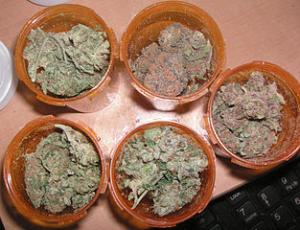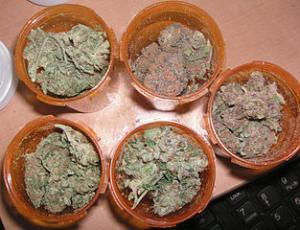Once again, the DEA refuses to quit treating marijuana like heroin.
The DEA has again refused to reschedule marijuana. Here's why it's not a big surprise nor that devastating.
The DEA again rejects marijuana rescheduling, a North Dakota initiative makes the ballot, a South Dakota one doesn't, a Missouri one hangs on by a thread, and more.
A former Virginia police chief goes down for using the drug buy fund to buy pills for himself, a former Guamanian customs agent goes down for helping a relative import meth, and a former New Jersey police sergeant goes down for peddling weed on the side.
Young people are the most likely to say they are regular users; churchgoers the least likely.
A Gallup poll shows a dramatic increase in admitted marijuana use by adults, a Barna poll shows little support for drug prohibition, Garden State needle exchanges are scrambling for money after their funding was vetoed, and more.
Marijuana arrest numbers are headed in the wrong direction in New York City, Ohio makes a first move toward implementing medical marijuana, New York Sen. Chuck Schumer declares war on new psychoactive substances, and more.
It grows quiet in the dog days of summer, but there is still some news: North Dakotans will vote on medical marijuana in November, California legalization foes sue over ballot argument language, and more.
The DEA is up to the same old same old, Arizona joins the list of states voting on marijuana legalization this fall, heroin overdoses jump in recent years in New York, and more.
The DEA today again refused to reschedule marijuana, arguing that its therapeutic value has not been scientifically proven. The move rejecting a rescheduling petition from two governors comes despite medical marijuana being legal in half the states and in the face of an ever-increasing mountain of evidence of marijuana's medicinal utility.
"DEA has denied two petitions to reschedule marijuana under the Controlled Substances Act (CSA)," the agency said in a
press release. "In response to the petitions, DEA requested a scientific and medical evaluation and scheduling recommendation from the Department of Health and Human Services (
HHS), which was conducted by the U.S. Food and Drug Administration (FDA) in consultation with the National Institute on Drug Abuse (
NIDA). Based on the legal standards in the CSA, marijuana remains a schedule I controlled substance because it does not meet the criteria for currently accepted medical use in treatment in the United States, there is a lack of accepted safety for its use under medical supervision, and it has a high potential for abuse."
Today's action marks at least the fourth time the DEA has rejected petitions seeking to reschedule marijuana. The effort to get the DEA to move marijuana off the same schedule as heroin has been going on since 1972, and once again has garnered the same result.
The move comes despite the expansion of state medical marijuana laws at least three more states will vote on it this year -- and a growing clamor for change, including from members of Congress. Just yesterday, the National Conference of State Legislatures adopted a resolution calling on the federal government to move marijuana off Schedule I.
The agency did announce one policy change that could make it easier to conduct marijuana research. It said it would end the University of Mississippi's monopoly on the production of marijuana for research purposes by granting growing licenses to a limited number of other universities.
But that was not nearly enough for marijuana reform advocates, who scorched the agency for its continuing refusal to move the drug off of Schedule I, if not outside the purview of the Controlled Substances Act altogether.
"This decision is further evidence that the DEA doesn't get it. Keeping marijuana at Schedule I continues an outdated, failed approach -- leaving patients and marijuana businesses trapped between state and federal laws," said Rep. Earl Blumenauer (D-OR).

The DEA again refuses to acknowledge marijuana's medicinal utility. (Creative Commons/Wikipedia)
"We are pleased the DEA is finally going to end NIDA's monopoly on the cultivation of marijuana for research purposes. For decades it has been preventing researchers from exploring the medical benefits of marijuana. It has also stood in the way of any scientific inquiries that might contradict the DEA's exaggerated claims about the potential harms of marijuana or raise questions about its classification under Schedule I," Tvert continued.
"The DEA's announcement is a little sweet but mostly bitter. Praising them for it would be like rewarding a student who failed an exam and agreed to cheat less on the next one. Removing barriers to research is a step forward, but the decision does not go nearly far enough. Marijuana should be completely removed from the CSA drug schedules and regulated similarly to alcohol," he concluded.
"For far too long, federal regulations have made clinical investigations involving cannabis needlessly onerous and have placed unnecessary and arbitrary restrictions on marijuana that do not exist for other controlled substances, including some other schedule I controlled substances," said Paul Armentano, deputy director of NORML.
"While this announcement is a significant step toward better facilitating and expanding clinical investigations into cannabis' therapeutic efficacy, ample scientific evidence already exists to remove cannabis from its schedule I classification and to acknowledge its relative safety compared to other scheduled substances, like opioids, and unscheduled substances, such as alcohol," he continued. "Ultimately, the federal government ought to remove cannabis from the Controlled Substances Act altogether in a manner similar to alcohol and tobacco, thus providing states the power to establish their own marijuana regulatory policies free from federal intrusion.
It is time for Congress to step up, Armentano said.

The DEA's approach. (DEA)
He wasn't the only one.
"It's really sad that DEA has chosen to continue decades of ignoring the voices of patients who benefit from medical marijuana," said Tom Angell, chairman of Marijuana Majority. "President Obama always said he would let science -- and not ideology -- dictate policy, but in this case his administration is upholding a failed drug war approach instead of looking at real, existing evidence that marijuana has medical value. This unfortunate decision only further highlights the need for Congress to pass legislation curtailing the ability of DEA and other federal agencies to interfere with the effective implementation of state marijuana laws. A clear and growing majority of American voters support legalizing marijuana outright and the very least our representatives should do is let states implement their own policies, unencumbered by an outdated 'Reefer Madness' mentality that some in law enforcement still choose to cling to."
Given that the DEA and the executive branch have proven -- once again! -- unwilling to remove the ideological blinders from their eyes, it is now indeed up to Congress. Perhaps after this coming election cycle, in which we are likely to see more states vote to approve medical marijuana and even more vote to just legalize it, Congress will see the writing on the wall.
back to top
This article was produced in collaboration with AlterNet and an earlier version appeared here.
The DEA's decision Thursday not to move marijuana from Schedule I of the Controlled Substances Act (CSA) ended months of speculation about whether the agency would finally act in accordance with an ever-increasing mountain of evidence of marijuana's medicinal utility and either schedule it less restrictively or deschedule it altogether.
Supporters of more enlightened marijuana policies were
disappointed, but not surprised. After all, the DEA has
a long history of rejecting and impeding science when it comes to marijuana. But even had DEA acted (it did ease the University of Mississippi's monopoly on growing marijuana for research purposes), the most likely move would have been grudgingly incremental, shifting marijuana from a schedule where it is grouped with heroin down to Schedule II, where it would be grouped with cocaine and
methamphetamines, and still not
prescribable absent FDA approval.
Or the agency could have taken some other largely unpalatable stance, such as making cannibidiol a Schedule III substance (like synthetic Marinol) while leaving the whole plant Schedule I. In any case, any move short of descheduling it entirely and treating it like alcohol and tobacco, would have left marijuana medicalized, but not normalized.
The article below was written days before the DEA's decision, but we think the discussion remains germane for understanding the issues around rescheduling and why most reformers are disappointed, but not devastated by the agency's stubborn refusal to budge.
While the DEA may move to reschedule marijuana to a lesser schedule, keeping it within the purview of the Controlled Substances Act means that it would still be illegal, even for medical use in the absence of FDA approval. Even with FDA approval, a years-long process, it would still require a prescription to obtain, which would do nothing to address legal adult marijuana sales, production, or possession in the states. Removing it from the CSA, or descheduling, is what consumers and the industry are calling for, but that is the unlikeliest outcome, even though that's how we deal with the two most commonly used recreational drugs in the United States, alcohol and tobacco.
Schedule I is reserved for substances that have "no currently accepted medical use and a high potential for abuse," the DEA notes. "Schedule I drugs are the most dangerous drugs of all the drug schedules with potentially severe psychological or physical dependence." Those drugs include heroin, Ecstasy, LSD, peyote…and marijuana.
For more than 40 years, the DEA has blocked efforts to have marijuana placed in a more appropriate schedule, one that reflects the plant's medicinal uses as well as its relative harmlessness compared to other scheduled substances. But that stance has grown increasingly untenable in the face of state-level medical marijuana programs and in the face of an ever-larger mountain of research that fails to find significant serious health consequences from marijuana use.
Now, the DEA is considering a decision on the most recent rescheduling petition. Earlier this year, the agency told lawmakers it "hopes to release its determination in the first half of 2016," but that clearly didn't happen. Late in June, DEA spokesman Russ Baer said the agency is "in the final stages" of making its determination. And just last week, Baer said, "We're closer than we ever were. It's a very deliberative process."
If the DEA decides not to keep marijuana in Schedule I, the most obvious incremental move would be for it to bump it down one step to Schedule II, placing pot in the same category as morphine, cocaine, and methamphetamine. That could pave the way for eventually allowing doctors to prescribe it, and would remove some roadblocks to further research. It might open the way for broader changes in financial and business regulations, although a shift to Schedule III or greater would be needed to address the debilitating 280E tax provision, which prevents cannabusinesses from deducting ordinary expenses like rent or payroll.

The DEA still doesn't see the "medical" in "medical marijuana." (Wikimedia/Creative Commons)
But Schedule II, or any of the lesser schedules, would require that marijuana be approved by Food and Drug Administration (FDA), a lengthy and expensive process that could bankrupt businesses attempting to overcome those regulatory hurdles. And until that happens, there is no approved marijuana for doctors to prescribe. It's also unclear whether the FDA would ever approve smoked marijuana.
Members of the marijuana industry, medical marijuana advocates, and marijuana consumer advocacy groups alike expressed skepticism about the DEA's willingness or ability to respond to the scientific evidence, uncertainty about what the agency was likely to do, and a demonstrated a pronounced -- if not unanimous -- preference not for rescheduling, but for descheduling.
Matthew Huron is a founder and former board member of the National Cannabis Industry Association and founder and current CEO of Good Chemistry Colorado, a vertically integrated cannabis company, as well as the co-founder of the Wellspring Collective, which caters to seniors with health challenges. Huron isn't exactly enthused by the prospect of Schedule II.
"Just to move it to Schedule II is more complicated than we're reading about," he said. "It might just be the molecule that gets rescheduled -- not cannabis. I don't think moving it to Schedule II would really have much effect on the states. It wouldn't hurt, but it wouldn't really help. Most of us in the industry would like to see it descheduled."
The medical marijuana advocacy group Americans for Safe Access (ASA) is pushing for Schedule II, but it's not relying on the DEA to make it happen.
"We don't have a crystal ball, and we don't know what the DEA will do, but based on past history, we don't have high hopes they will reschedule," said ASA spokesperson Melissa Wilcox. "It's possible they will de- or reschedule CBD and leave whole plant cannabis at Schedule I. Who knows? The DEA tends to ignore the science."
Schedule II "would remove barriers to scientists wishing to do research, so we know best how to use cannabis -- targeting, dosing, all the questions we haven't been able to study because it is such a pain to get research done now," said Wilcox.
But with little faith in the DEA, ASA is instead pushing for a legislative solution, the Compassionate Access, Research Expansion, and Respect States' Rights (CARERS) Act, also known as S. 683, which is currently bottled up in the Senate Judiciary Committee, chaired by octogenarian prohibitionist Sen. Chuck Grassley (R-IA).
The CARERS Act would move marijuana to Schedule II, as well as deschedule CBD, open up access to marijuana business banking, and end the NIDA monopoly on growing marijuana for research, among other provisions.
"We're pretty sure this could pass, but Grassley is the gatekeeper, and we're pushing hard to get him to schedule a vote," said Wilcox.
"Moving marijuana to Schedule II is not a solution," said Mason
Tvert, communications director for the
Marijuana Policy Project, which has played -- and continues to play -- a major role in advancing both medical marijuana and legalization at the state level. "It would certainly remove barriers to research, but it would still treat marijuana as if it were as harmful as cocaine and other illegal substances, when it is objectively less harmful than alcohol. We fully support removing marijuana from the schedules and treating it like alcohol,"
Tvert emphasized.
"We think marijuana should be removed entirely from the Controlled Substances Act," said Dale Gieringer, long-time head of California NORML, representing consumers and small growers in the nation's most populous state. "As a fallback position, we've been litigating since 1972 to get it rescheduled to Schedule II. If they do that, that would be good -- they'd only be 45 years overdue," he noted.
"From the standpoint of states that have state-legal suppliers, Schedule II doesn't accomplish a whole lot," Gieringer said. "Those state-legal suppliers wouldn't become federally legal; they'd have to first obtain FDA approval. Until that happens, everybody is an illegal producer of a scheduled drug under federal law," he said.
"Schedule II would allow doctors to write prescriptions -- but nobody could fill them," Gieringer noted. "There are international prescriptions and international suppliers, though. But the main impact would be doctors would feel better and cops couldn't argue that marijuana isn't a medicine. If they're trying to create a niche for existing legal medical marijuana state, putting it in Schedule II is like creating a square hole for a round peg."
Marijuana patients, consumers, and the industry are all waiting for the DEA to act, but aren't really holding out much hope it will do the right thing. And even the half-steps it might take, such as moving it to Schedule II or separating out CBDs for lower scheduling, aren't going to substantially alter marijuana's legal status or resolve the conflicts between state-level legality and federal marijuana prohibition. When it comes to rescheduling marijuana, there's just not that much there there.
back to top
The DEA again rejects marijuana rescheduling, a North Dakota initiative makes the ballot, a South Dakota one doesn't, a Missouri one hangs on by a thread, and more.
NationalOn Thursday, DEA again refused to reschedule marijuana. The DEA today again refused to reschedule marijuana, arguing that its therapeutic value has not been scientifically proven. The move rejecting a rescheduling petition from two governors comes despite medical marijuana being legal in half the states and in the face of an ever-increasing mountain of evidence of marijuana's medicinal utility. Today's action marks at least the fourth time the DEA has rejected petitions seeking to reschedule marijuana. The effort to get the DEA to move marijuana off the same schedule as heroin has been going on since 1972, and once again has garnered the same result. The agency did announce one policy change that could make it easier to conduct marijuana research. It said it would end the University of Mississippi's monopoly on the production of marijuana for research purposes by granting growing licenses to a limited number of other universities.
Missouri
On Monday, a medical marijuana initiative campaign vowed to go to court to try to overturn invalidated signatures. New Approach Missouri announced that it will go to court this month to overturn invalidated signatures so that its medical marijuana initiative can appear on the November ballot. The campaign has enough valid signatures to qualify in every congressional district except the state's second, where local election officials invalidated more than 10,000 signatures, leaving the campaign roughly 2,200 short of the 32,337 required in that district.
Ohio
On Tuesday, Ohio took the first step toward getting medical marijuana up and running. The state Medical Marijuana Control Program has unveiled a website with the first information on how it plans to implement the state's new medical marijuana law. Medical marijuana will not be available before September 2018, as the state works to develop rules and regulations.
North Dakota
On Tuesday, a medical marijuana initiative qualified for the November ballot. The secretary of state's office has confirmed that Compassionate Care Act initiative has submitted enough valid signatures to qualify for the November ballot. The initiative would allow patients suffering from a list of specified medical conditions to possess up to three ounces of marijuana and grow their own if they are more than 40 miles away from a licensed dispensary. Dispensaries would be nonprofits.
South Dakota
On Tuesday, a state court judge rejected a medical marijuana initiative campaign's appeal. The state will not be voting on the issue this November after a state court judge denied a request from the campaign to overturn Secretary of State Shantel Krebs' finding that the group did not hand in enough valid voter signatures to qualify for the ballot. South Dakota has twice previously rejected medical marijuana at the polls -- the only state to do so.
[For extensive information about the medical marijuana debate, presented in a neutral format, visit MedicalMarijuana.ProCon.org.]
back to top
A former Virginia police chief goes down for using the drug buy fund to buy pills for himself, a former Guamanian customs agent goes down for helping a relative import meth, and a former New Jersey police sergeant goes down for peddling weed on the side. Let's get to it:
In Alta Vista, Virginia, the former Alta Vista police chief pleaded guilty Wednesday to one felony count for using department drug buy funds to buy pills for himself and faking paperwork to hide it. Former Chief Kenneth Walsh, 51, had been charged with 15 felonies, but pleaded guilty to a single count of forging public documents. He also entered Alford pleas -- meaning he maintained his innocence while acknowledging there was evidence to convict him -- to 11 counts of forging public documents, one count of embezzlement, and one count of obtaining drugs by fraud. His sentencing is set for October.In Linden, New Jersey, a former Linden police sergeant was sentenced last Friday to probation after he was busted for selling marijuana. Former Sgt. William Turbett III, 30, went down after police served a search warrant on his home and found "a small amount" of weed. He was a seven-year veteran of the department and earned a salary of $105,000 last year. He can no longer work in law enforcement.
In Hagatna, Guam, a former Guam customs agent was sentenced Monday to 14 years in federal prison for participating in a scheme to import two pounds of methamphetamine into the US territory. Jayvin Wyll Ueda Remoket pleaded guilty to one count of conspiracy to distribute methamphetamine and one count of warning the subject of a search. Remoket used his position as a customs agent to help a relative get the packages through customs.
back to top
A new Gallup poll reports that the number of people who use marijuana has nearly doubled since 2013. That year, 7% of adults said they were current marijuana users; this year, the number jumped to 13%.

Pot becomes a popular pasttime. (Darren Frisby Harris/Drug Policy Alliance)
Gallup reports consistent majority support nationwide for marijuana legalization since 2013, and it found that residents in the West, where four states have already legalized marijuana, were significantly more likely to report being regular users.
Most of the increase occurred between 2013 and 2015, when regular use hit 11% before climbing another two points between then and now.
Colorado and Washington legalized weed in 2012, joined by Alaska, Oregon, and the District of Columbia two years later. This year, legalization will be on the ballot in five states, including California, and medical marijuana will be up for a vote in at least three more.
Now, some 43% of Americans say they have ever tried marijuana, similar to last year's 44% and up slightly from 38% in 2013. In 1969, when Gallup first asked the question, only 4% said they had ever tried it.
According to the survey, the key determinants of marijuana use are age and religiosity. Among adults under 30, nearly one out five (19%) report current use, double the rate seen in any of the older groups. But only 2% of weekly church goers are users and only 7% of less frequent worshippers are. Among people who seldom or never go to church, 14% reported current use.
While 12% of men claimed current use, only 7% of women did. And, as noted above, 14% of Westerners were current users, compared with 9% of Easterners and Midwesterners and only 6% of Southerners.
Marijuana's decades-long move toward social acceptance continues.
back to top
A Gallup poll shows a dramatic increase in admitted marijuana use by adults, a Barna poll shows little support for drug prohibition, Garden State needle exchanges are scrambling for money after their funding was vetoed, and more.

Marijuana use is becoming more acceptable. (Darren Frisby Harris/Drug Policy Alliance)
Gallup: Number of American Adult Marijuana Users Nearly Doubles in Three Years. A new Gallup poll reports that the number of people who smoke pot has nearly doubled since 2013. That year, 7% of adults said they were current marijuana users; this year, the number jumped to 13%. It's not clear whether or to what degree the reported sharp increase is attributable to an actual increase in regular marijuana users or whether it's because people are more willing to admit their pot use in an era of growing acceptance of marijuana and spreading legalization of the herb.
Medical Marijuana
Missouri Initiative Campaign Asks Court to Overturn Invalidated Signatures. New Approach Missouri announced Monday that it will go to court this month to overturn invalidated signatures so that its medical marijuana initiative can appear on the November ballot. The campaign has enough valid signatures to qualify in every congressional district except the state's second, where local election officials invalidated more than 10,000 signatures, leaving the campaign roughly 2,200 short of the 32,337 required in that district.
Drug Policy
Poll: Only One-Third Thinks All Drugs Should Be Illegal. A new poll from Barna, a firm that surveys on religious issues, finds that only 32% of respondents think all drugs should be illegal. Some 40% think hard drugs should be illegal, but not marijuana, while another 13% think all drugs should be legal and regulated and another 3% believe all drugs should be legal and should not be regulated. If you add those all up, it's 56% for marijuana legalization and 16% for legalizing all drugs.
Harm Reduction
New Jersey Needle Exchanges Are Strapped for Cash. The operators of the state's five needle exchange programs have launched an online fundraising drive this week with a GoFundMe account after a one-time federal grant has run out. Lawmakers had allocated $95,000 to cover program costs, but Gov. Chris Christie (R) line item vetoed that funding in June. "Our governor claims to be fiscally conservative and pro-life. So, how is it that he refuses to fund a simple, inexpensive, effective intervention that saves lives at significantly lower cost than the cost of medical care after a person has been infected with HIV or Hepatitis C or both?" said Diana McCague, the founder of the first underground needle exchange program in the mid-90s called The Chai Project. "Can it be that he's willing to risk the lives of human beings because they use drugs? I think 'pro-life' means pro-all-life."
back to top
Marijuana arrest numbers are headed in the wrong direction in New York City, Ohio makes a first move toward implementing medical marijuana, New York Sen. Chuck Schumer declares war on new psychoactive substances, and more.

Chuck Schumer wants to play whack-a-mole with K2 and Spice. (LA Dept. of Health)
New York City Marijuana Arrests on the Rise Again. After declining during the first two years of Mayor Bill de Blasio's (D) administration, pot arrests are on the rise again in the Big Apple. The 9,331 people arrested on possession charges in the first half of this year is a 30% increase over the same period last year. That's not good news, but it's still nowhere near as bad as it was under Michael Bloomberg. In 2010, more than 50,000 were arrested for pot; this year, if current trends keep up, it will still be under 20,000.
Medical Marijuana
Ohio Takes First Step Toward Getting Medical Marijuana Up and Running. The state Medical Marijuana Control Program has unveiled a website with the first information on how it plans to implement the state's new medical marijuana law. Medical marijuana will not be available before September 2018, as the state works to develop rules and regulations.
South Dakota Judge Rejects Medical Marijuana Initiative Campaign's Appeal. The state will not be voting on the issue this November after a state court judge denied a request from the campaign to overturn Secretary of State Shantel Krebs' finding that the group did not hand in enough valid voter signatures to qualify for the ballot. South Dakota has twice previously rejected medical marijuana at the polls -- the only state to do so.
New Psychoactive Substances
Sen. Schumer Responds to New Drugs With Old Prohibitionist "Whack-A-Mole" Strategy. Sen. Charles Schumer (D-NY) announced today that he is filing a new bill that would criminalize the chemicals used to make new psychoactive substances such as synthetic cannabinoids ("Spice," "K2"), synthetic stimulants ("bath salts"), and synthetic opioids. "We need a federal hammer to nail these toxic concoctions of synthetic drugs to reverse this troubling trend… This federal legislation will ban 22 synthetic drugs, including powerful forms of fentanyl, crippling the unlawful chemists cooking up these drugs and the cartels that push them to our local stores and streets. Banning these drugs quickly will help the feds step up their game of whack-a-mole so that we can help stem the tide of synthetic drug use here in New York State and across the country."
International
Dark Web Drug Sales Triple Since End of Silk Road. It's been three years since federal authorities shut down the Silk Road dark web drug sales website, but online illicit drug sales have never been higher. Drug sales have tripled since then to somewhere between $12 million and $20 million a month, while revenues have doubled, according to a study published by Rand Corporation Europe. While dark web drugs sales make up only a small fraction of all illicit drug sales, many of the transactions are for more than $1,000, suggesting that drugs are being purchased online for resale on the streets.
back to top
It grows quiet in the dog days of summer, but there is still some news: North Dakotans will vote on medical marijuana in November, California pot legalization foes sue over ballot argument language, and more.

Medical marijuana shops could be coming to North Dakota. (Creative Commons/Wikimedia)
California Legalization Foes Sue Over Prop 64 Ballot Language. Opponents of the Prop 64 legalization initiative organized as No on 64 have sued the California secretary of state, alleging that Prop 64 ballot arguments could deceive voters. The group claims the ballot arguments are false and misleading in regard to TV advertising and marijuana delivery services. Last week, Prop 64 supporters also sued, alleging opposition arguments were false and misleading.
Medical Marijuana
North Dakota Initiative Qualifies for November Ballot. The secretary of state's office has confirmed that Compassionate Care Act initiative has submitted enough valid signatures to qualify for the November ballot. The initiative would allow patients suffering from a list of specified medical conditions to possess up to three ounces of marijuana and grow their own if they are more than 40 miles away from a licensed dispensary. Dispensaries would be nonprofits.
International
Philippines' Deadly Anti-Drug Policies Spark Protests. With the death toll from police an vigilante killings of alleged drug users and sellers already climbing into the hundreds just weeks after President Rodrigo "Death Squad" Duterte took office, the public backlash is beginning. On Wednesday, protestors gathered at the Redemptorist Church in Paranaque City to demand an end to the killings.
back to top
The DEA is up to the same old same old, Arizona joins the list of states voting on marijuana legalization this fall, heroin overdoses jump in recent years in New York, and more.
Marijuana PolicyDEA Again Refuses to Reschedule Marijuana. The DEA today again refused to reschedule marijuana, arguing that its therapeutic value has not been scientifically proven. The move rejecting a rescheduling petition from two governors comes despite medical marijuana being legal in half the states and in the face of an ever-increasing mountain of evidence of marijuana's medicinal utility. Today's action marks at least the fourth time the DEA has rejected petitions seeking to reschedule marijuana. The effort to get the DEA to move marijuana off the same schedule as heroin has been going on since 1972, and once again has garnered the same result. The agency did announce one policy change that could make it easier to conduct marijuana research. It said it would end the University of Mississippi's monopoly on the production of marijuana for research purposes by granting growing licenses to a limited number of other universities.
Arizona Legalization Initiative Qualifies for November Ballot. It's official: State officials have confirmed that the initiative from the Campaign to Regulate Marijuana Like Alcohol has gathered enough valid voter signatures to qualify for the November ballot. The initiative will appear on the ballot as Proposition 205.
Heroin and Prescription Opioids
Fatal Overdoses Have Jumped in New York City in Recent Years. Fatal drug overdoses have jumped 66% in the city between 2010 and 2015, the city Department of Health and Mental Hygiene Reported Tuesday. Last year, 937 New Yorkers died of overdoses, compared to 541 in 2010. Heroin was involved in 59% of the deaths.
International
Vietnam Sentences Nine to Death for Smuggling Heroin to China. A court in Lang Son has handed out death sentences to nine men for smuggling about 500 pounds of heroin to China. Two others were sentenced to life in prison. Under Vietnamese law, possession or sale of more than 100 grams of heroin is punishable by death.
back to top











